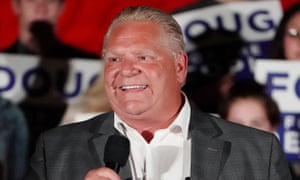Millions of residents in Canada’s most populous province will head to the polls on Thursday in a fraught vote whose final stretch has been overshadowed by the legacy of Rob Ford, the late former Toronto mayor who made headlines around the world after he admitted to smoking crack cocaine while in office.
Polls suggest Ontario’s Conservatives are neck-and-neck with the left-of-centre New Democratic party (NDP) to helm Ontario, pitting the rightwing populist politics that have rattled countries around the world against promises to increase government spending and raise taxes on corporations and the wealthy.
Few had predicted that the race would be so tense: earlier this year most assumed the Conservatives would easily sail into a majority government. Approval ratings for their main rival, the current Liberal premier, Kathleen Wynne, had tumbled to the lowest in Canada as residents grappled with rising inequality, stagnating incomes and economic uncertainty.
Months before the election, the Conservatives found themselves in turmoil after their leader, Patrick Brown, accused of sexual misconduct, resigned. Doug Ford, the brother of Rob, threw his hat in the ring, surprising many when he emerged victorious as Ontario’s new Conservative leader.
A businessman who rails against the elite and regularly peppers his speeches and interviews with boasts and falsehoods, Ford soon began drawing comparisons to Donald Trump, prompting questions as to whether the divisive wedge politics that have swept countries around the world had landed in Canada.
Ford came with the baggage of being his brother’s most aggressive defender, lashing out at Toronto police and journalists as Rob fended off allegations of smoking crack.
Doug was also plagued by his own set of drug-related allegations; in 2013, the Globe and Mail reported that he had sold hashish for several years in the 1980s. Ford has denied the claims.
During the campaign, Ford capitalised on residents’ frustration and deep clamour for change, filling venues across the province as he promised to cut income taxes by 20%, reduce the price of gasoline, boost spending on healthcare and transit and repeal carbon pricing.

Pointing to the multimillion-dollar label company he had inherited from his father, he touted his business acumen and vowed to erect a neon sign at the US border reading “Ontario is open for business”.
But the Conservatives’ commanding lead eroded as Ford refused to detail how his promises would be funded – simply saying he would find “efficiencies” across the government – and amid calculations that suggest his tax cuts would disproportionately benefit the province’s wealthiest.
His advisers – many of whom worked for the former prime minister Stephen Harper – responded by clamping down on media access to Ford, limiting questions at press conferences and denying most interview requests.
Polls suggested that some voters turned away, instead looking to the New Democrats, led by Andrea Horwath, and their pledges to drastically expand universal healthcare, reduce childcare costs and replace student loans with grants.
Despite polls suggesting that both parties are averaging around 37% support, the expected distribution of votes across ridings in the province – and Ontario’s first-past-the-post voting system – suggest the Conservatives could still win a majority.
Just days before the vote, Ford family drama roared into the headlines, as the widow and children of Rob Ford filed a C$16.5m ($12.3m) lawsuit in a Toronto court. Rob, who served as Toronto’s mayor from 2010 to 2014, died in March 2016 after a battle with cancer.
The lawsuit accused Doug Ford of being a “negligent” business manager whose decisions had steadily chipped away at the value of the company the Ford brothers had inherited from their father, Deco labels.
Along with alleging losses of C$5m in the past seven years, the lawsuit claims that Doug, along with his other brother, Randy, does not have “the education and business ability to justify their employment as senior officers of Deco”, noting that the two also “failed” to retain competent management or appropriate business advisers to assist them.
The allegations have not been proven in court. “Those claims are false and without merit,” Ford told reporters on Tuesday. “And it will be very clear when we prove that in court.”
His political opponents jumped on the lawsuit. “Doug Ford has promised to run the province like a business,” the NDP noted in a statement. “But if he can’t run his own business properly, how can he be trusted to run the province?”
Wynne, the Liberal leader, described the lawsuit as distressing. “It’s distressing because this is the kind of thing we will get daily from Doug Ford as premier. Chaos and confusion. It’s not what Ontario needs,” she wrote on social media.